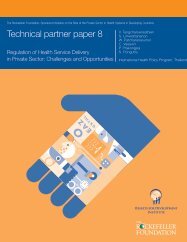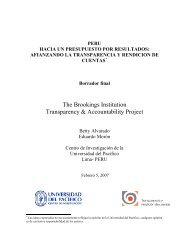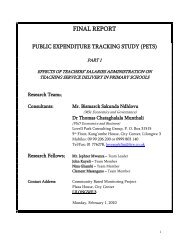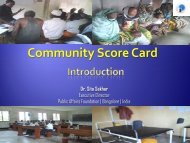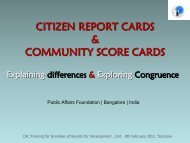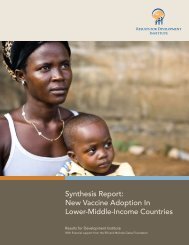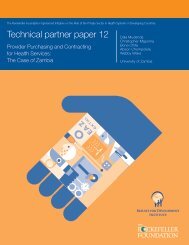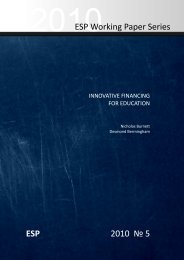Innovative Secondary Education For Skills Enhancement
Innovative Secondary Education For Skills Enhancement
Innovative Secondary Education For Skills Enhancement
Create successful ePaper yourself
Turn your PDF publications into a flip-book with our unique Google optimized e-Paper software.
than there is currently in Africa. All countries have moved<br />
or are moving to articulate the skills to be imparted in<br />
both academic and vocational streams—this is the case<br />
in Thailand, Malaysia, and Indonesia and is coming more<br />
slowly in South Asia, especially in Bangladesh and India.<br />
In all these countries, however, these curricula are largely<br />
defined in terms of cognitive and technical skills; largely<br />
missing are the non-cognitive skills so sought by employers.<br />
Even where there has been some attempt to modify<br />
the curriculum in the non-cognitive direction, it has<br />
been relatively limited and has tended to focus most on<br />
non-traditional skills specific to a context (e.g., Sri Lanka’s<br />
attempt to introduce entrepreneurship).<br />
Although the curricula can be—and are being—reformed<br />
and improved, the curriculum itself is not the major<br />
reason that students in all the Asian countries fall short<br />
of employers’ skill expectations. The real problem in Asia<br />
is that the teachers who teach the curriculum are not<br />
sufficiently effective. Most teachers take a “direct transmission”<br />
view of student learning, seeing their job as to<br />
impart specific knowledge, rather than the constructivist<br />
view now common to most Asian curricula that implies<br />
that teachers should be much more enablers of learning.<br />
Math and science subjects, for example, are taught more<br />
for examinations using rote learning than for practical<br />
applications. Grammar is considered more important<br />
than communication. No Asian developing country uses a<br />
framework for assessing teacher effectiveness in the way<br />
that the Teaching and Learning International Survey, or<br />
TALIS, for example, is used in some OECD countries like<br />
Australia.<br />
Detailed interviews with educators and administrators<br />
were carried out in India. They reveal three main reasons<br />
advanced by teachers for their inability to teach the curriculum<br />
sufficiently effectively:<br />
a. Indian syllabi do not clearly articulate skills.<br />
b. The language of the 2005 National Curriculum<br />
Framework does include skills but in too<br />
complicated a way to provide practical help to<br />
teachers.<br />
c. The curriculum is mainly focused on cognitive skills<br />
and insufficiently on non-cognitive ones.<br />
22 <strong>Innovative</strong> <strong>Secondary</strong> <strong>Education</strong> <strong>For</strong> <strong>Skills</strong> <strong>Enhancement</strong> (ISESE)





